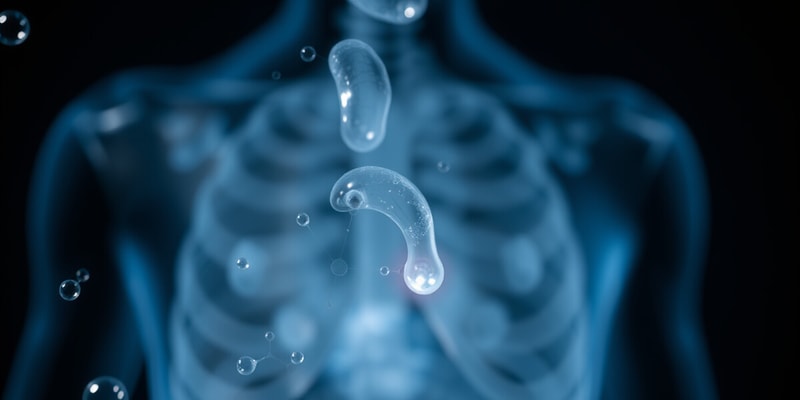Podcast
Questions and Answers
What is a potential consequence of administering high dosages of propofol?
What is a potential consequence of administering high dosages of propofol?
In insulin-dependent diabetes mellitus, what is the primary effect of inadequate insulin?
In insulin-dependent diabetes mellitus, what is the primary effect of inadequate insulin?
What characterizes alcoholic ketoacidosis compared to starvation ketoacidosis?
What characterizes alcoholic ketoacidosis compared to starvation ketoacidosis?
Why does renal failure result in metabolic acidosis?
Why does renal failure result in metabolic acidosis?
Signup and view all the answers
What is a consequence of hyperglycemia in insulin-dependent diabetes mellitus?
What is a consequence of hyperglycemia in insulin-dependent diabetes mellitus?
Signup and view all the answers
Which symptom is NOT typically associated with salicylate intoxication?
Which symptom is NOT typically associated with salicylate intoxication?
Signup and view all the answers
What is a primary consequence of ethylene glycol metabolism in the liver?
What is a primary consequence of ethylene glycol metabolism in the liver?
Signup and view all the answers
Which of the following conditions can precipitate metabolic acidosis?
Which of the following conditions can precipitate metabolic acidosis?
Signup and view all the answers
Which clinical manifestation is commonly observed in children with mild or moderate metabolic acidosis?
Which clinical manifestation is commonly observed in children with mild or moderate metabolic acidosis?
Signup and view all the answers
What is a potential outcome of methanol ingestion?
What is a potential outcome of methanol ingestion?
Signup and view all the answers
What is a common consequence of ureterosigmoidostomy?
What is a common consequence of ureterosigmoidostomy?
Signup and view all the answers
What is a sequela of rapid resolution of respiratory alkalosis?
What is a sequela of rapid resolution of respiratory alkalosis?
Signup and view all the answers
Which condition can lead to lactic acidosis due to impaired oxygen delivery?
Which condition can lead to lactic acidosis due to impaired oxygen delivery?
Signup and view all the answers
Which genetic disorder is associated with hyperkalemic renal tubular acidosis?
Which genetic disorder is associated with hyperkalemic renal tubular acidosis?
Signup and view all the answers
What is a potential cause of lactic acidosis in children with short bowel syndrome?
What is a potential cause of lactic acidosis in children with short bowel syndrome?
Signup and view all the answers
Which medication class is known to potentially cause lactic acidosis?
Which medication class is known to potentially cause lactic acidosis?
Signup and view all the answers
What is the typical outcome when the underlying cause of lactic acidosis is addressed?
What is the typical outcome when the underlying cause of lactic acidosis is addressed?
Signup and view all the answers
What characterizes the metabolic compensation for chronic respiratory alkalosis?
What characterizes the metabolic compensation for chronic respiratory alkalosis?
Signup and view all the answers
What is the most common presenting complaint in distal renal tubular acidosis?
What is the most common presenting complaint in distal renal tubular acidosis?
Signup and view all the answers
Which of the following conditions is often associated with proximal renal tubular acidosis?
Which of the following conditions is often associated with proximal renal tubular acidosis?
Signup and view all the answers
In hyperkalemic renal tubular acidosis, which of the following is a common cause?
In hyperkalemic renal tubular acidosis, which of the following is a common cause?
Signup and view all the answers
What is a characteristic feature of untreated patients with proximal renal tubular acidosis?
What is a characteristic feature of untreated patients with proximal renal tubular acidosis?
Signup and view all the answers
Which feature distinguishes mixed renal tubular acidosis from the other forms?
Which feature distinguishes mixed renal tubular acidosis from the other forms?
Signup and view all the answers
What is a potential outcome of chronic hypophosphatemia in children with proximal RTA?
What is a potential outcome of chronic hypophosphatemia in children with proximal RTA?
Signup and view all the answers
What is pseudohypoaldosteronism type I primarily characterized by?
What is pseudohypoaldosteronism type I primarily characterized by?
Signup and view all the answers
Which statement about aldosterone deficiency in children is true?
Which statement about aldosterone deficiency in children is true?
Signup and view all the answers
Study Notes
Lactic Acidosis
- High doses of propofol and propylene glycol can induce lactic acidosis.
- Linezolid is another medication linked to lactic acidosis.
- Common causes include inadequate oxygen delivery, shock, anemia, and hypoxemia.
- Lactate is produced through anaerobic metabolism; the liver metabolizes it to bicarbonate to correct acidosis.
- In severe liver dysfunction, lactate metabolism can be impaired, causing lactic acidosis.
- Metabolically active malignancies and short bowel syndrome can lead to lactic acidosis due to inadequate blood supply or bacterial overgrowth.
Insulin-Dependent Diabetes Mellitus
- Inadequate insulin can lead to hyperglycemia and diabetic ketoacidosis (DKA).
- DKA results in the production of acetoacetic and β-hydroxybutyric acids, contributing to metabolic acidosis.
- Insulin administration helps convert keto acids into bicarbonate, aiding in metabolic acidosis correction.
- Urinary losses of keto acids can hinder bicarbonate regeneration, requiring renal function for full correction.
- Hyperglycemia leads to osmotic diuresis, causing volume depletion and loss of key electrolytes.
Starvation and Alcoholic Ketoacidosis
- Starvation leads to a mild metabolic acidosis due to increased kidney acid secretion.
- Alcoholic ketoacidosis often follows binge drinking with poor food intake; it can be more severe than starvation-related acidosis.
- Blood glucose in alcoholic ketoacidosis can vary, and hypoglycemia may indicate a metabolic disorder.
Renal Failure
- Renal failure impairs acid excretion, causing metabolic acidosis.
- Remaining nephrons can compensate in mild cases, but significant impairment leads to accumulation of acids.
Hyperkalemic Renal Tubular Acidosis (RTA)
- Isolated hyperkalemia is common in transplant recipients; hyponatremia is rare.
- Hyperkalemic RTA can arise from conditions like Gordon Syndrome, causing volume expansion and hypertension.
Children with Abnormal Urinary Tracts
- Surgical diversions like ureterosigmoidostomy often lead to metabolic acidosis and hypokalemia.
- Ileal conduits are preferred, though they still pose a risk for metabolic acidosis.
Metabolic Compensation for Chronic Respiratory Alkalosis
- Decreased renal acid excretion and reduced serum bicarbonate occur to counteract respiratory alkalosis.
- Following resolution of respiratory alkalosis, residual decreased bicarbonate can lead to metabolic acidosis.
Forms of Renal Tubular Acidosis (RTA)
- Distal (Type I), Proximal (Type II), Mixed (Type III), and Hyperkalemic (Type IV) RTA exist, each with distinct features.
- Distal RTA presents with hypokalemia and the inability to acidify urine (pH > 5.5).
- Proximal RTA is associated with Fanconi syndrome, leading to multiple urinary losses.
- Mixed RTA relates to osteopetrosis caused by carbonic anhydrase II mutations.
- Hyperkalemic RTA can stem from aldosterone deficiency, leading to various electrolyte imbalances.
Salicylate Intoxication & Metabolic Acidosis
- Symptoms include fever, seizures, lethargy, hyperventilation, tinnitus, and coma.
- Ethylene glycol metabolizes to oxalic acid, causing severe metabolic acidosis and kidney damage.
- Methanol ingestion results in formic acid production, leading to CNS damage, metabolic acidosis, and visual impairment.
Causes and Clinical Manifestations of Metabolic Acidosis
- Causes include toluene inhalation, paraldehyde ingestion, and inborn errors of metabolism.
- Inborn errors can lead to episodic metabolic acidosis precipitated by specific dietary substrates or stress.
- Clinical manifestations depend on the severity of acidemia and may be more pronounced with concomitant respiratory acidosis.
- Serum pH changes correlate with the degree of acidemia experienced by patients.
Studying That Suits You
Use AI to generate personalized quizzes and flashcards to suit your learning preferences.
Description
This quiz delves into the factors contributing to lactic acidosis, including medication effects and metabolic disorders. It also explores insulin-dependent diabetes mellitus and its complications, such as diabetic ketoacidosis. Test your knowledge on these critical topics in metabolic conditions.




